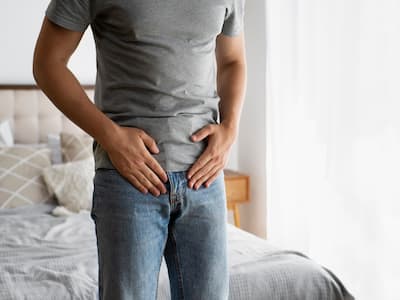Winter Blues For Men: Understanding The Impact On Prostate Health

![]() VERIFIED
VERIFIED

The cold weather can cause tension in the pelvic floor muscles, leading to increased bladder spasms and frequent urination.
Men with Benign Prostatic Hyperplasia (BPH) or enlarged prostate may face additional problems during winter. This article aims to shed light on how to take care of your prostate health when the temperature outside drops. The winter season is known to have an impact on the prostate, a key part of the male reproductive system, which consists of the penis, prostate, seminal vesicles, and testicles. This is particularly seen in men with Benign Prostatic Hyperplasia (BPH), or an enlarged prostate. The prostate is a small gland situated between the bladder and the penis. It houses the urethra, which functions as a conduit for urine from the bladder to the penis. Additionally, it produces a fluid that supports and safeguards sperm. Winter can give a tough time to men by causing prostate-related issues. Dr. Jitendra Sakhrani, Urologist at Apollo Spectra Mumbai shares some insights about this problem while also enumerating the treatment options for the problem.
Understanding The Link Between Prostate Problems And Cold Weather
The cold weather can cause tension in the pelvic floor muscles, leading to increased bladder spasms and frequent urination. In the case of BPH, the prostate gland enlarges and pressurizes the urethra, inviting urinary symptoms that can significantly impact one’s lifestyle if not addressed promptly. Moreover, decreased sweating in winter can contribute to increased urination, which may be mistaken for urinary tract infections and lead to unnecessary antibiotic use, potentially causing medication resistance. Hence, one can notice symptoms such as trouble initiating urination, frequent or urgent urge to urinate, dribbling at the end of urination, increased nighttime urination (nocturia), and inability to fully empty the bladder. Although these symptoms are not life-threatening, they do impact quality of life and raise the risk of urinary infections.
Complications Of BPH
If BPH is not addressed, an enlarged prostate can harm bladder muscles and lead to bladder stones, recurrent UTIs, and in some cases complete urinary blockage and retention.
How To Detect BPH?
It is important to gather comprehensive information about the individual’s health, including a digital rectal examination. According to Dr. Jitendra Sakhrani, a complete Urinalysis, ultrasound of the abdomen, and prostate-specific antigen (PSA) test should be conducted for prompt diagnosis. In cases where the prostate feels firm upon palpation and the PSA levels are elevated, an ultrasound-guided biopsy is recommended to confirm the presence or absence of prostate cancer.
Treatment
The initial phase of treatment involves a combination of lifestyle adjustments and medication. In certain cases where there is no substantial blockage, lifestyle modifications can alleviate symptoms related to the prostate. Patients can also be given medications that relax the prostate gland or reduce its size. A surgery will be the last resort and your doctor will guide you regarding it.
Here are some tips by Dr. Jitendra that can help tackle BPH symptoms:
- Ensure your bladder is empty when urinating, and avoid consuming fluids 2-3 hours before sleeping to avoid nighttime bathroom trips.
- Steer clear of foods detrimental to prostate health, including spicy, fried, and processed items, sugar, artificial sweeteners, dairy products, and red meat.
- Cut down on salty foods and alcohol consumption. Refrain from caffeinated beverages like coffee, tea, and soda due to their potential to exacerbate urinary issues.
- Address obesity as it is associated with various prostate health problems.
- Stress can worsen BPH symptoms; combat it through regular physical activity, meditation, or yoga.
Post source: The Health Site




